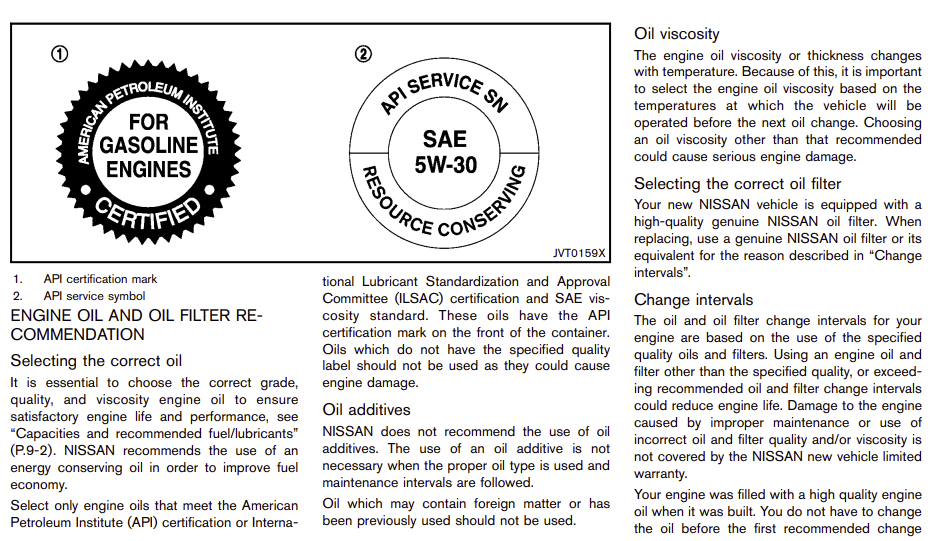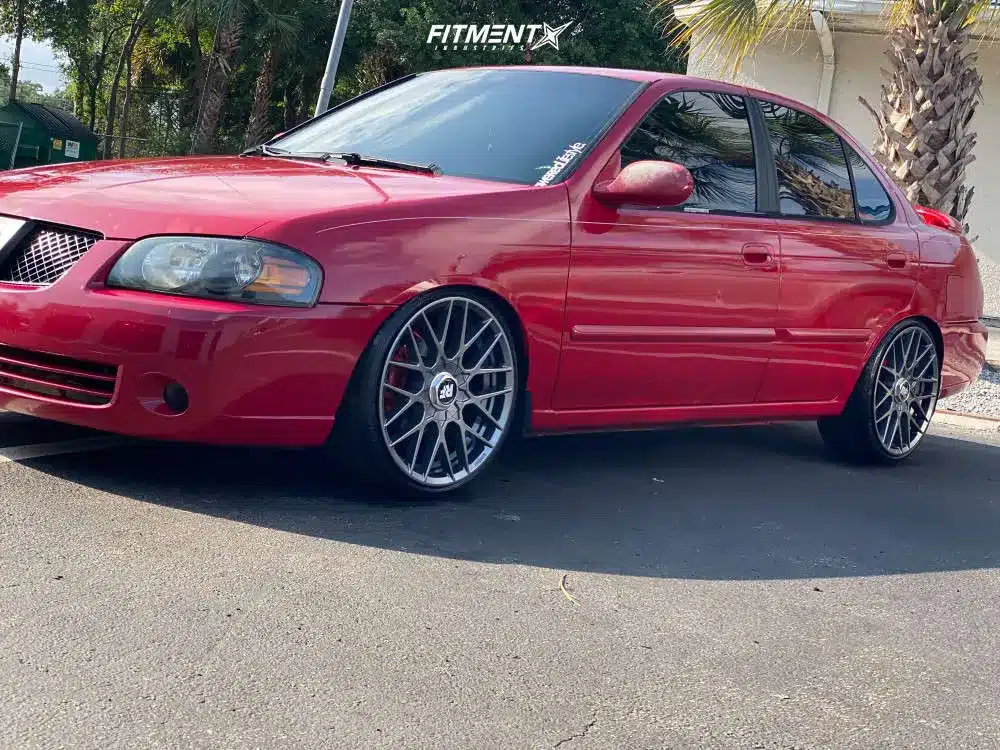The 2013 Nissan Juke, like any other vehicle, relies on engine oil to keep its engine running smoothly and efficiently. Engine oil plays a crucial role in reducing friction, cooling the engine, and protecting its components from wear and tear.
Using the correct oil type and following the manufacturer’s recommendations is essential for maintaining optimal engine performance, fuel efficiency and prolonging the life of your Juke.
What Type Of Oil Does A Nissan Juke Take?
A Nissan Juke with 1.6L engine takes oil with a viscosity grade of SAE 5W-30, as recommended by the manufacturer. It is important to choose an oil that meets the American Petroleum Institute (API) certification or International Lubricant Standardization and Approval Committee (ILSAC) certification.
Selecting the correct engine oil for your 2013 Nissan Juke is crucial for ensuring satisfactory engine life and performance. The right engine oil will have the proper grade, quality, and viscosity suitable for your vehicle’s engine. These factors are essential for minimizing friction, providing adequate lubrication, and maintaining overall engine health.
Nissan recommends using an energy conserving oil to improve fuel economy. Energy conserving oils are designed to reduce internal engine friction, which in turn reduces fuel consumption. When choosing engine oil, look for oils labeled as “Energy Conserving” to help maximize your Juke’s fuel efficiency.

Using engine oils that do not have the specified quality labels can be detrimental to your vehicle, potentially causing engine damage. It is essential to avoid such oils, as they may not meet the necessary performance and quality standards required for your 2013 Nissan Juke. Always choose engine oils with the proper API or ILSAC certifications to ensure the best protection for your vehicle’s engine.
To ensure that you are selecting a high-quality oil for your Juke, only choose engine oils that meet the American Petroleum Institute (API) certification or International Lubricant Standardization and Approval Committee (ILSAC) certification. These certifications guarantee that the oil has met the required performance and quality standards. Certified oils will display the API and/or ILSAC certification marks on the front of the container.
The American Petroleum Institute (API) Certification Mark is an essential indicator of the quality and performance of engine oils. It assures that the oil meets the industry’s established standards and is suitable for use in your 2013 Nissan Juke. When selecting engine oil, always look for the API Certification Mark on the front of the container to ensure that you are using an oil that meets the necessary requirements for your vehicle.
Viscosity refers to the thickness and flow resistance of a liquid, in this case, engine oil. The SAE (Society of Automotive Engineers) has established a grading system to classify the viscosity of engine oils. For the 2013 Nissan Juke, the recommended viscosity grade is SAE 5W-30. This grade indicates that the oil has a low viscosity at cold temperatures (5W) and a higher viscosity at operating temperatures (30).
Using the appropriate viscosity grade is crucial to ensure optimal engine performance, fuel efficiency, and safeguarding against engine wear and tear. It is recommended to strictly follow the manufacturer’s guidelines when selecting engine oil for your Nissan Juke.
Oil Viscosity
Engine oil viscosity refers to its thickness and flow resistance. As the temperature changes, so does the viscosity of the oil. Oil tends to become thicker at lower temperatures, while it becomes thinner at higher temperatures. This change in viscosity can affect the oil’s ability to provide adequate lubrication and protection for your engine’s components.

Choosing the correct oil viscosity for your Nissan Juke is crucial for optimal engine performance and protection, especially under different operating conditions. As mentioned earlier, the manufacturer-recommended viscosity grade for a Nissan Juke is SAE 5W-30. This grade provides a balance of low viscosity at cold temperatures (5W) and higher viscosity at operating temperatures (30).
Following the manufacturer’s recommendations and using the proper viscosity grade will ensure that your engine receives the right level of lubrication and protection under various temperature conditions. Using a viscosity grade other than the one recommended by Nissan can lead to serious engine damage, so it is crucial to always adhere to the specified guidelines.
Oil Filter Selection
When it comes to oil filters, using a genuine Nissan oil filter or its equivalent is essential for maintaining optimal engine performance and protection. Genuine Nissan oil filters are specifically designed for your vehicle, ensuring proper fit and function. They are built to meet the manufacturer’s specifications and performance standards, providing the best possible filtration and debris removal for your Juke’s engine. Using a low-quality or ill-fitting oil filter can compromise engine performance and potentially cause damage in the long run.
It is crucial to maintain the health and optimal performance of your Nissan Juke’s engine by adhering to the recommended intervals for oil and oil filter changes. It is imperative to use high-quality oils and filters for these intervals. Deviating from these recommendations or using subpar products could result in engine damage and a reduced lifespan for your vehicle.
Your Nissan Juke’s engine was filled with high-quality engine oil when it was built, so you do not need to change the oil before the first recommended change interval. However, it is important to note that operating conditions, such as repeated short-distance driving at cold temperatures, driving in dusty conditions, extensive idling, or stop-and-go commuting, may require more frequent oil and filter changes.
2013 Nissan Juke Oil and Filter Change Intervals
Several factors can impact the frequency at which you need to change your Nissan Juke’s engine oil and filter. These factors include your driving habits, the type of oil used, the quality of the oil filter, and the specific operating conditions your vehicle is subjected to. By understanding these factors, you can better determine when it’s time for an oil and filter change to maintain optimal engine performance.
Certain operating conditions can necessitate more frequent oil and filter changes for your Nissan Juke. These conditions include:
- Repeated short distance driving at cold outside temperatures: Frequent short trips in cold weather can lead to condensation buildup in the oil, causing it to break down more quickly.
- Driving in dusty conditions: Dust and dirt particles can contaminate the oil, reducing its effectiveness and leading to increased engine wear.
- Extensive idling: Prolonged idling can cause increased engine temperatures, putting more stress on the oil and causing it to break down faster.
- Stop-and-go commuting: Frequent stopping and starting in traffic can generate more heat in the engine, leading to quicker oil breakdown and increased engine wear.
The engine oil capacity for the 1.6L 4-cylinder MR16DDT Turbo engine in the Nissan Juke is 4.8 quarts (4.5 liters) when the oil filter is also replaced. It is important to use the recommended SAE 5W-30 viscosity oil and a genuine Nissan oil filter or its equivalent to ensure optimal engine performance and protection.
Synthetic vs. Conventional Oil
Synthetic oils offer several benefits for the Nissan Juke compared to conventional oils:
- Improved engine protection: Synthetic oils have a more uniform molecular structure, providing better lubrication and reducing friction between engine components, which can lead to less wear and tear.
- Better performance at extreme temperatures: Synthetic oils are more resistant to thermal breakdown, maintaining their viscosity and lubricating properties in high-temperature situations while also flowing more easily at colder temperatures, ensuring proper engine start-up and lubrication.
- Enhanced fuel efficiency: The reduced friction from synthetic oils can help improve fuel efficiency, potentially leading to cost savings over time.
- Longer oil change intervals: Synthetic oils generally last longer than conventional oils, which may allow for extended oil change intervals, reducing maintenance frequency and costs.
While synthetic oils offer several advantages, they tend to be more expensive than conventional oils. Here is a comparison of the two oil types:
- Engine protection: Synthetic oil provides superior protection against wear, corrosion, and sludge buildup compared to conventional oil.
- Temperature performance: Synthetic oils perform better under extreme temperatures, maintaining their viscosity at high temperatures and flowing more easily at low temperatures.
- Fuel efficiency: Synthetic oils can improve fuel efficiency due to reduced internal engine friction.
- Oil change intervals: Synthetic oils typically have longer change intervals than conventional oils, which can lead to lower maintenance costs over time.
- Price: Conventional oils are generally less expensive than synthetic oils. However, considering synthetic oil’s potential benefits and cost savings, the investment may be worthwhile for your Nissan Juke.
While the manufacturer-recommended oil for the Nissan Juke is SAE 5W-30, you may choose to use a synthetic oil with the same viscosity rating to take advantage of the added benefits it provides. Always consult your owner’s manual or consult with a qualified mechanic to ensure you are using the appropriate oil type for your specific vehicle.
Oil Additives
Nissan does not recommend the use of oil additives in their vehicles. They believe that when the proper oil type is used and maintenance intervals are followed, there is no need for additional oil additives. The use of oil additives can interfere with the oil’s performance, potentially causing harm to your engine in the long run.
To keep your Nissan Juke’s engine performing at its best and lasting long, it’s essential to use the correct oil type and follow recommended maintenance schedules. The recommended oil type is SAE 5W-30, and it’s important to use a genuine Nissan oil filter or its equivalent to ensure proper lubrication and protection of your engine’s components.
Signs of Oil-Related Issues
Oil leaks can lead to reduced engine performance and potential damage if not addressed promptly. Some signs that your Nissan Juke may have an oil leak include:
- Oil spots on the ground: If you notice dark, oily spots beneath your vehicle, it may indicate an oil leak. After driving, park your car on a clean surface and check for any drips or puddles.
- Low oil levels: Regularly check your engine oil level using the dipstick. If you find that the oil level consistently drops between oil changes, this could be a sign of a leak.
- Burning oil smell: If you detect a burning oil odor while driving or after parking, it may indicate oil is leaking onto hot engine components.
- Smoke from the exhaust: Blue or gray smoke from the exhaust can be a sign of oil leaking into the combustion chamber.
- Engine overheating: An oil leak can cause inadequate lubrication, leading to increased friction and, eventually, overheating.
Low or deteriorated engine oil can negatively impact your Nissan Juke’s performance and engine life. Here are some symptoms to watch for:
- Decreased performance and fuel efficiency: Low or old engine oil may cause reduced performance and decreased fuel efficiency due to increased friction and wear.
- Increased engine noise: If your engine becomes noisier, especially during startup or acceleration, it could indicate low or deteriorated oil.
- Warning lights: The oil pressure warning light on your dashboard may illuminate if there is a drop in oil pressure due to low or deteriorated oil levels.
- Dirty or dark oil: Check your engine oil using the dipstick. It may be time for an oil change if it appears dark and dirty or has a gritty texture.
- Excessive exhaust smoke: Thick, blue or gray smoke from the exhaust may indicate oil burning in the combustion chamber due to low or deteriorated oil levels.
If you notice any of these signs, it is essential to address the issue promptly by checking your oil level, changing the oil if necessary, and seeking professional assistance if needed. Proper maintenance and timely oil changes are crucial for maintaining your Nissan Juke’s engine performance and longevity.
Can I use 5W-30 in a Nissan Juke?
Yes, you can use 5W-30 engine oil in a Nissan Juke. According to the owner’s manual for the 2013 Nissan Juke, the recommended engine oil viscosity is SAE 5W-30. Using the correct viscosity oil is essential for maintaining satisfactory engine life and performance. Always consult your specific vehicle’s owner’s manual to ensure you are using the appropriate oil type and viscosity for your Nissan Juke.
Conclusion
This article discussed the importance of using the correct oil type, viscosity, and filter for your 2013 Nissan Juke. We highlighted Nissan’s engine oil recommendations, including using SAE 5W-30 viscosity oil that meets API or ILSAC certification and opting for energy conserving oils.
We also touched on the importance of using genuine Nissan oil filters or their equivalent and avoiding oil additives. Additionally, we explored the factors that may necessitate more frequent oil and filter changes and emphasized the need to follow the manufacturer’s maintenance intervals.
Following Nissan’s recommended oil type, viscosity, filters, and maintenance intervals is essential to maintain your Juke’s engine performance, fuel efficiency, and longevity. These guidelines will safeguard your engine from avoidable wear and tear, prevent potential damage, and keep your vehicle performing at its best. Using the recommended oil type, a premium filter, and adhering to regular maintenance will result in a seamless and dependable driving experience with your Nissan Juke.










